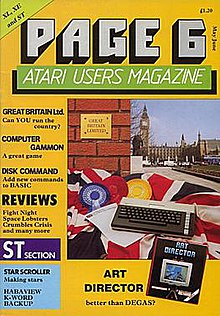Page 6

Cover of Page 6 magazine from May/June 1987
|
|
| Editor | Les Ellingham |
|---|---|
| Categories |
Atari 8-bit family Atari ST |
| Frequency | Bi-monthly |
| Publisher | Page 6 Publishing |
| Year founded | 1982 |
| Final issue | 1998 |
| Based in | Stafford |
| Language | English |
| ISSN | 0952-4967 |
Page 6 (subtitled Atari Users Magazine, and later known as New Atari User) was an independent British publication aimed at users of Atari home computers. It was published between 1982 and 1998. The computer magazine supported both the Atari 8-bit family of computers (400/800/XL/XE) and the Atari ST range.
The magazine had its origins in the newsletter of the Birmingham User's Group, an independent Atari club based in England. Les Ellingham was appointed to be the editor of the newsletter, but decided to produce a magazine with broader appeal instead. He remained editor of Page 6 throughout its entire run of 85 issues. Although subscription-only for most of its life, it was available through newsagents during the late 1980s and early 1990s.
When Database ceased publication of the original Atari User magazine in 1988, Page 6 bought the rights (and subscriber list), and renamed their magazine, firstly to Page 6 Atari User in February 1989 and then to New Atari User in June of the same year. The latter was simply Page 6 under a different (and more newsagent-friendly) name, and had next to no continuity with the original Atari User. The editor Les Ellingham had declined the offer to edit the original Atari User when approached by Database Publications in 1985.
The magazine's name derives from the area of memory in 8-bit Atari computers covering locations 1536–1791 ($600–$6FF; "$" was the standard prefix on the Atari assembler for hexadecimal notation). As memory was divided into 'pages' of 256 bytes (the first being page 0), locations 1536 (256×6) to 1791 were known as 'page 6'. Page 6 memory was neither used by the operating system nor by Atari BASIC programs and so could be used to store the user's own short machine code routines without them being overwritten. In a similar manner, the publishers of Page 6 magazine wanted readers to contribute useful type-in programs and articles.
...
Wikipedia
